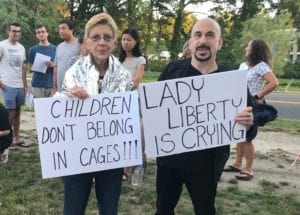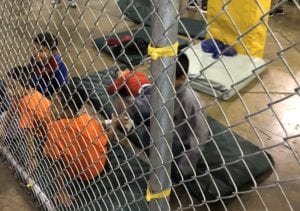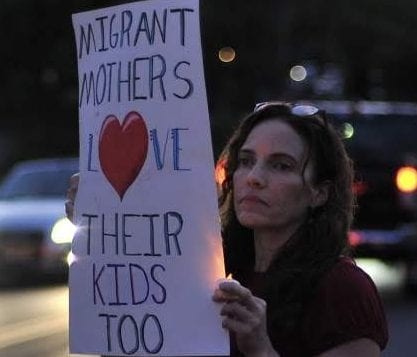Community groups call for action to fix border crisis
By Leah Chiappino
“I’m hungry here at Clint all the time … I’m too scared to ask the officials for any more food,” a 12-year-old boy stated in testimony read at the Lights for Liberty candlelight vigil, held July 12 in Huntington Village. It was one of more than a thousand vigils held both nationally and internationally in protest of family separations and the conditions at the United States-Mexico border, where children are being held in cages.

Local pediatrician Dr. Eve Krief helped coordinate the event as founder of Long Island Communities Against Hate in a joint effort with multiple other organizations and churches that include the Unitarian Universalist Church of Huntington and St. John’s Episcopal Church.
“My mother taught me silence is complicity and if we don’t speak out, we are all responsible,” she said. “If we let the inhumanity go on, we lose our own humanity.”
Krief’s own mother was a Holocaust survivor who lost both parents and two sisters during Hitler’s reign.
During Friday’s rally, the names of children who died in detention facilities were recited, as folk musicians performed.
Local teenagers read the written testimonies of immigrant children. A 17-year-old pregnant mother described guards taking blankets and mattresses from detainees at 3 a.m., leaving babies as young as two months old sleeping on a concrete floor.
“I think guards act this way to punish us,” she stated.
The testimonies read also included the experience of a 16-year-old mother, who described sleeping on floor mats with aluminum blankets, and not being offered a shower for days. “They took our baby’s diapers, formula and all of our belongings,” she stated. “There is no soap and our clothes are dirty.”
A 17-year-old boy’s testimony described conditions at the Ursula detention center were a toilet sits out in the open inside the “cage” where he was being held. He lacked not only privacy but also access to soap, paper towels, a toothbrush and toothpaste.

Another mother stated that when her baby became sick, the guard told her to “just deal with it.” She asked for help two more times, then broke down in tears before officers took the child to a doctor. Other testimonies that were read also contained reports of sick children being denied care, with another guard saying, “She doesn’t have the face of a sick baby. She doesn’t need to see a doctor,” after a mother reported her baby was vomiting and had diarrhea.
Some children described children being separated from their parents. Children as young as two years old were left alone and crying, only to be mocked and ignored by the guards.
At least seven children have died in custody of U.S. Customs and Border Patrol in the past year, according to government officials, compared to zero in the last decade.
“We want our country to once again represent the words inscripted on the Statue of Liberty that welcomes the tired, huddled masses yearning to breathe free. We want our country to welcome those legally seeking asylum in our country as they escape danger and violence,” Krief said. “Instead, however, we are seeing children and families held in inhumane and overcrowded conditions and we are seeing ongoing family separation.”
The groups participating in Lights for Liberty demand that changes be made at the border, which include improving children’s living conditions at both border and detention centers, and releasing the 13,000 children living in detention facilities who don’t know when they will be released.
Krief said many have family members who willing to take them in but are not permitted to.
Protesters are also demanding that the administration return to the policies of the Flores Settlement Agreement, a 1997 provision that detailed the procedure for unaccompanied minors entering the United States. The policy was reversed by the Trump administration’s “zero-tolerance” policy, a crackdown on illegal immigration that ultimately led to family separation.
Flores, according to Krief, limited the time children spend in U.S. Customs and Border Patrol custody to 72 hours, compared to the current status of children who stay in custody for weeks. The Flores agreement also states that children should not be kept in detention facilities for more than 20 days, according to the law, but minors have reported staying for upwards of nine months. Lights for Liberty also demands Customs and Border Patrol allow congressional visits to detention facilities in order to increase oversight. Final demands include access to pediatric care and other necessities, not separating children from their parents unless a welfare agency deems them unfit, and the accountability of people who carried out secret separations, even before the zero-tolerance program, which has led to separated children who may never be reunited with their parents.
“My hope in all of these events is to increase public awareness and to get people to understand this should not be about politics, but humanity,” she said. “The conditions these children are kept in borders on child abuse. Looking back, this will be a dark stain on our country’s history because we are traumatizing children and families who are only legally seeking asylum in our country after escaping dangerous conditions in their own countries.”
However, in response to backlash against people like U.S. Rep. Alexandria Ocasio-Cortez (D-Bronx), who referred to the detention centers as concentration camps, she feels the situation is too dire to play politics and worry about labels.
“There’s been a lot of questions from people about us referring to these detention centers as concentration camps, which they do meet the definition for, but I feel if we wait for perfect analogies then it will be too late.”
Krief, who sits on the executive committee of the Long Island Queens and Brooklyn chapter of American Academy of Pediatrics, added that the health effects of the conditions in detention facilities are detrimental and potentially irreversible.
“As a pediatrician I am appalled and horrified at the conditions that we’re keeping children in,” she said. “We’re emotionally traumatizing them, and we’re physically traumatizing them.”
Children are experiencing Toxic Stress Syndrome, she said, as a result of extreme stress, which changes the architecture of the brain and affects children the rest of their lives.
Congress has attempted to remedy conditions at the border, according to a New York Times report, having passed a bill granting $4.5 billion dollars in humanitarian aid to the border, which included improvements to hygiene, medical care and training for workers along with limiting a detention center stay of a child to 90 days unless no other facilities are available.
Krief feels this is not enough.
“There’s no oversight to where the funds are going,” she said. “It doesn’t increase the transparency in these facilities.”
Krief encourages the public to call their representatives in order to protest the conditions, a notion that was advocated at the vigil.
“This is an emergent human rights violation,” she said. “Unless they hear from all of their constituents on both sides of the aisle, every single day, demanding they address the inhumanity, they won’t do anything, which is unacceptable and shameful.”
Photos from Steven Zaitz and Rep. Tom Suozzi’s Office (detention center)
Correction: The printed version of this story erroneously referred to toxic stress syndrome as toxic shock syndrome.







